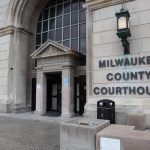Who Is Conducting Gableman’s Investigation?
Private lawyer and partisan group heavily involved in taxpayer funded election probe.

Erick Kaardal delivers remarks to members of the Wisconsin Assembly elections committee at the State Capitol in Madison, Wis., on March 1, 2022. Kaardal and the nonprofit law firm, Thomas More Society, are playing unofficial but central roles in the ongoing investigation into Wisconsin’s 2020 presidential election. (John Hart / Wisconsin State Journal)
A two-story office building in a Milwaukee suburb houses three entities that have led a months-long campaign sowing doubt about Wisconsin’s 2020 presidential election.
The gray, indistinct building in Brookfield lists about a dozen occupants, including a marketing company on the first floor, and financial services firms on the second.
The three, led by former Wisconsin Supreme Court Justice Gableman, are collaborating on the $676,000 investigation into alleged election fraud launched by Assembly Speaker Robin Vos.
Although he lacks a contract or official role in Gableman’s taxpayer-funded investigation, Kaardal has become a de facto lead investigator. A Wisconsin Watch analysis shows roughly half of the chapters in Gableman’s 136-page interim report are based on Kaardal’s work.
Since September, the Minnesota attorney and the conservative Chicago law firm for which he works have subleased office space for about $3,000 a month directly from a company owned by Gableman.

This Brookfield, Wis., office building is the headquarters for former state Supreme Court Justice Michael Gableman’s investigation of the 2020 election. Attorney Erick Kaardal and the Thomas More Society are subleasing office space from Gableman’s company as they assist in the Assembly’s investigation. The building was photographed on April 13, 2022. (Matt Mencarini / Wisconsin Watch)
Kaardal’s and Thomas More Society’s connections to — and potential influence on — Gableman’s investigation stretch beyond 2,100 square feet of office space. As a private attorney, Kaardal also represents people under guardianship orders featured in Gableman’s investigation — clients he charges are victims of “voter abuse.”
Rep. Mark Spreitzer, D-Beloit, a member of the Assembly Committee on Campaigns and Elections, said he “absolutely” has concerns about the relationship between Kaardal, the Thomas More Society and Gableman.
“It’s cherry-picked (data) at best, and simply wrong at worst,” Spreitzer said.
Gableman’s office did not return a message seeking comment, and neither did representatives for Vos, R- Rochester, or Democratic Attorney General Josh Kaul, who is suing Gableman and Vos, arguing they lack authority to force officials to participate in the investigation.
Gableman’s original contract expired at the end of last year, but was extended through the end of this month. It now appears to be nearing a close. Gableman has said recently Vos intends to halt his investigation before the end of the month.
‘Pro-family’ group shifts to elections
For nearly 25 years, the Thomas More Society was best known for filing pro-life and “pro-family” litigation, including representing a California baker who refused to make a cake for a same-sex couple’s wedding.
But in recent years, Kaardal and the Thomas More Society have become central figures in questioning the validity of the 2020 election — pushing theories that judges, audits and other reviews have rejected.

Erick Kaardal delivers remarks to members of the Wisconsin Assembly elections committee at the State Capitol in Madison, Wis., on March 1, 2022. Kaardal and the nonprofit law firm, Thomas More Society, are playing unofficial but central roles in the ongoing investigation into Wisconsin’s 2020 presidential election. (Screenshot via WisEye)
The society’s funding has ballooned as it added election-related litigation to its focus areas. Its financial statement for the 2020 fiscal year, the most recent available, showed $17.4 million in revenue, up from $9.6 million the previous year.
Among Kaardal’s other election-related lawsuits is a 2020 case against then-Vice President Mike Pence, Congress and others seeking to stop the Electoral College count that was so filled with “baseless fraud allegations and tenuous legal claims” that the judge filed an ethics referral against him. That matter is still pending.
Last month, as Gableman presented the findings in his interim report to the Assembly Committee on Campaigns and Elections, he complimented Kaardal and the Thomas More Society, saying they’d done “very substantial and very wonderful work on behalf of the people of this state.”
But the tangled relationships raise questions about who Kaardal is really working for: himself and his clients, the Thomas More Society or the state of Wisconsin.
‘Unseemly’ relationship?
Much of what Gableman released last month repackaged previous work from Kaardal and the Thomas More Society, including video interviews with seven of Kaardal’s own clients.
Kaardal told Wisconsin Watch he provided the former justice with information that he gathered while preparing for lawsuits and complaints, but that Gableman didn’t pass along anything his team had learned.

Attorneys for the Thomas More Society, Peter Breen, vice president and senior counsel, and Thomas Brejcha, president and chief counsel, pose in their Chicago offices on July 10, 2013. The Thomas More Society is playing a central but unofficial role in the investigation into Wisconsin’s 2020 presidential election. (Nancy Stone / Chicago Tribune)
Tom Brejcha, Thomas More Society’s president, said in an interview that he saw no conflicts of interest with the connections and communications between himself, his law firm and Gableman. And he became angry when pressed to clarify those relationships.
“We worked with him on the investigation,” Brejcha said of the connection with Gableman, later adding that “we wanted to know the nature of the investigation and how we could help.”
“I’m sure we’ve exchanged information about matters of public concern,” Brejcha said, adding that he’s talked with Gableman “a handful of times” but declined to say how often or when they last spoke.
At one point, Brejcha accused Wisconsin Watch of launching an “attack” on Gableman. “I don’t care to continue this anymore,” he said, and eventually hung up.
Jeff Mandell, a Madison attorney who specializes in election law, said it’s an “unseemly” relationship between entities with different goals.
“There’s certainly a blurring of lines,” he said, “between what’s supposed to be an independent government investigation and private, partisan actors.”
‘Protect the people from the government’
Kaardal has been a lawyer since the early 1990s and, in his own words, has made a career of suing the government.
“My viewpoint is that the most important thing for courts to do is protect the people from the government,” he said.
He’s filed dozens of lawsuits in state and federal courts — many of them over election administration.
In 2012, Kaardal unsuccessfully challenged Minnesota’s same-day voter registration procedure, which Wisconsin also has. That lawsuit also alleged that Minnesota residents who were under guardianship orders and ineligible to vote were able to register and cast ballots, a claim he’s made in Wisconsin in recent months in complaints he filed with the Wisconsin Elections Commission. The argument also failed in Minnesota, but Gableman included the allegations in his report and presentation in March.
In 2019, Kaardal represented a group of landlords in Minneapolis and St. Paul in a federal lawsuit that argued ordinances that required them to provide voter registration information to new tenants violated their First Amendment right to not speak.
Kaardal and the landlords won.
‘Christian heritage’ advocacy, ethics complaint
As the 2020 election neared, Kaardal filed a flurry of lawsuits in multiple states.
He sued over masks mandated for in-person voting in Minnesota, which he lost. He represented Kanye West in his attempts to get on the presidential ballot in Wisconsin, and lost.

In his 2013 book, Erick Kaardal, an attorney for the Thomas More Society, argues for a national immigration policy to limit non-Christians and non-Jews to less than 10% of the U.S. population. Kaardal is playing a central but unofficial role in the election investigation led by former Wisconsin Supreme Court Justice Michael Gableman. (Screenshot from Amazon.com)
And in December 2020, he filed a lawsuit on behalf of plaintiffs including the Wisconsin Voters Alliance — part of a multi-state “election integrity watchdog” group — to prevent Pence and Congress from counting the electoral votes on Jan. 6, arguing that only state legislatures had the authority to certify the election.
The day after the election was certified, Kaardal voluntarily dismissed the lawsuit in federal court in Washington, D.C. But that didn’t stop a federal judge from referring him to the Committee on Grievances for potential discipline. The judge called Kaardal’s legal theory “somewhere between a willful misreading of the Constitution and fantasy.” Kaardal is fighting the referral. He declined to comment on it.
Kaardal also co-authored several books, including a 2013 tome that advocated for preserving “the Christian cultural heritage” of the United States through immigration policies that would limit the number of people who are not Jewish or Christian to no more than 10% of the population.
In an email, Kaardal defended his writing, saying, “The books, if one reads them, stand on their own as an attempt to contribute to current political philosophy.”
Thomas More turns to elections
Since the early 1990s, the Thomas More Society — which operates as a tax exempt 501(c)(3), the same nonprofit designation as Wisconsin Watch — has spent much of its time and resources on anti-abortion and self-described family values lawsuits. It is named after St. Thomas More, the patron saint of lawyers among Catholics.
The law firm successfully defended a maternity shelter in Missouri that fought a state mandate to provide insurance coverage for contraception. And during the pandemic, it represented churches that refused to abide by government-issued COVID-19 restrictions, getting victories for some of their clients.
In January, the firm won a $75,000 settlement for a Louisville, Kentucky police officer who was investigated for marching in uniform with protesters outside of an abortion clinic.
A year before the 2020 election, the public interest law firm added “voter integrity” and “voter participation” to its mission statement for the first time. Kaardal told Wisconsin Watch that the group had seen election administration issues had “ripened” over the years and become “politicized.”
Mandell, the election law attorney, said despite the society being new to election litigation, “They have certainly come with a vengeance for it in Wisconsin.”
Election grants at heart of probe
In his March presentation to the committee, Gableman adopted the society’s oft-repeated claim that officials in five Democratic-leaning cities — Green Bay, Kenosha, Milwaukee, Madison and Racine — committed “election bribery” by accepting $8.8 million in grants.
Gableman’s charge is that officials in those “Zuckerberg 5” cities used illegal grant money from the Center for Tech and Civic Life — which went to more than 200 Wisconsin municipalities — to facilitate voting. The money went toward training additional election workers, adding secure ballot drop boxes, conducting voter education campaigns and other tasks.

Michael Gableman delivers remarks to members of the Wisconsin Assembly elections committee at the State Capitol in Madison, Wis., on March 1, 2022. Roughly half of Gableman’s report on his election investigation delivered that day was based on work by attorney Erick Kaardal and the nonprofit Thomas More Society law firm, who have no official role in the taxpayer-funded probe. (John Hart / Wisconsin State Journal)
The state election bribery law bans anyone from giving money, employment or anything else of value to entice someone to vote or not vote, or to vote a particular way. Gableman devotes nearly half of his 136-page interim report to these grants.
Prior to the election, Kaardal filed a federal lawsuit in Wisconsin over the CTCL money, which a judge dismissed. After the election, he filed complaints with the Wisconsin Elections Commission, which were also thrown out.
“We can’t have third parties using private money to influence cities to do an illegal … election administration,” Kaardal said. “And so that’s why we’re gonna win.”
But so far, that hasn’t happened.
He’s filed state and federal lawsuits over the CTCL grant money in at least five states: Wisconsin, Michigan, Pennsylvania, Iowa and Georgia. Kaardal lost all the lawsuits filed before the election. Some suits Kaardal filed after the election remain pending.
Atiba Ellis, a Marquette University law school professor who specializes in election law, said grants to help municipalities run elections are accepted practice across the country.
“Short of voters getting paid directly out of these grants, it seems difficult for me to make a connection between what the folks who are getting these grants are doing and credible claims or bribery,” Ellis said.
He said labeling the grants as election bribery is “a dangerous road to go down” because local governments rely on grant money to carry out all sorts of basic functions.
It’s a “disservice to the law,” Ellis said, “to suggest fraudulent behavior on the most tenuous evidence.”
Spreitzer, the Democratic Assembly member, said he asked the Legislative Council for any case law supporting Gableman’s bribery claim. He said there was none.
Kaardal’s self-styled competency tests
A second major Kaardal and the Thomas More Society claim that landed in Gableman’s report: that nursing home residents who lacked mental capacity to vote had cast absentee votes — a practice they call “voter abuse.”
In four cases, Gableman alleged that residents who had been found legally incompetent to vote had cast ballots, which raises questions about the validity of those votes.
But in other cases, Gableman relied on Kaardal’s personal assessment to question a voter’s competence.

Erick Kaardal interviews nursing home resident Sandra Klitzke in this WisEye video played at a March 1, 2022 Wisconsin Assembly elections committee hearing. Klitzke’s last name is misspelled on the video. (Screenshot from WisEye)
That is not how Wisconsin law works, however. Only a judge in the context of a guardianship proceeding can determine whether a person has the mental capacity to cast a ballot, according to the Wisconsin Elections Commission. Being placed under guardianship on its own does not remove a person’s right to vote. And, “state law does not allow for the right to vote to be taken away, even by family members, without such an adjudication,” the elections agency said.
Gableman included videos of Kaardal interviewing nursing home residents along with their guardians — who are also Kaardal’s clients — in his presentation to the Assembly elections committee last month. He said he got his clients’ approval before sharing them.
Kaardal asked about a preferred choice between hypothetical candidates — one who wanted to raise taxes and another who didn’t — as well as questions about what happens on Election Day and how a winner is picked. The befuddled residents often stumbled over their answers to Kaardal’s sometimes long-winded questions.
Gableman described Kaardal’s test as “questions that are put out by the elections boards to help determine whether someone has the acuity to be able to make a knowing choice for voting. He’s not making these questions up. They’re standardized questions to determine if a potential voter has the mental capacity to vote.”
But Kaardal described them much differently. He told Wisconsin Watch he found the questions online in a law review or medical journal article. While on the phone with a reporter, Kaardal searched for the article and its questions online, but could not find them.
“I don’t even know if I spent the time saving it, but I should have,” he said. “… I found it online. If I searched a little bit more I could find it. But if you just put in ‘competency assessment test for voting,’ I think you’ll end up finding where I found it.”
The top Google search results for “competency assessment test for voting” include a Wikipedia article describing literacy tests that some jurisdictions used to disenfranchise Black voters for a long stretch of American history. Such tests have been banned for more than 50 years, since the passage of the Voting Rights Act.
‘Their voting rights must be upheld’
Barbara Beckert, of the advocacy group Disability Rights Wisconsin, picked apart Kaardal’s self-styled competency examination during the Wisconsin Elections Commission meeting in March.
“Wisconsin does not require or allow voting tests that people must pass in order to vote — nor should they,” Beckert said. “No voter in Wisconsin has ever (been) asked this type of question, and voters are never asked to explain why they vote for a particular candidate.”

Assembly elections committee member Rep. Mark Spreitzer, D-Beloit, says he is concerned about the role of Erick Kaardal and the Thomas More Society in the taxpayer-funded probe into Wisconsin’s 2020 presidential election. He is seen at Gov. Tony Evers’ second State of the State address at the State Capitol on Jan. 22, 2020 in Madison, Wis. (Coburn Dukehart / Wisconsin Watch)
Federal law requires Medicaid-certified long term care facilities to support residents who want to vote, she said, “And we’re concerned that as a result of these investigations, care facility staff are now afraid to assist residents with voting.”
Beckert added that “It’s discriminatory and unconscionable to disenfranchise Wisconsin citizens simply because they live in a care facility. Their voting rights must be upheld.”
After Gableman showed the videos during the March 1 hearing, Spreitzer said he submitted an open records request for the full, unedited version of the interviews. He was told Gableman didn’t have them — raising yet more questions, Spreitzer said, about the role of Kaardal and the Thomas More Society in the investigation.
The nonprofit Wisconsin Watch (www.WisconsinWatch.org) collaborates with WPR, PBS Wisconsin, other news media and the University of Wisconsin-Madison School of Journalism and Mass Communication. All works created, published, posted or disseminated by Wisconsin Watch do not necessarily reflect the views or opinions of UW-Madison or any of its affiliates.
More about the 2020 General Election
- Senator Agard Statement on Senator Knodl’s Continued Relitigation of the 2020 Presidential Election - Dane County Executive Melissa Agard - Aug 29th, 2023
- Report Calls For Criminally Charging State’s Fake Electors - Henry Redman - Dec 19th, 2022
- Vos Withdraws Subpoenas, Ends Gableman Probe - Henry Redman - Aug 30th, 2022
- Judge Blasts Gableman Probe, Deleted Records - Henry Redman - Aug 17th, 2022
- Vos Fires Gableman, Ends Election Probe - Shawn Johnson - Aug 14th, 2022
- Judge Orders Gableman To Pay $163,000 In Legal Fees - Rich Kremer - Aug 2nd, 2022
- Prosecute 2020 Fake Electors, Advocates Demand - Erik Gunn - Aug 1st, 2022
- Trump Calls For Nullification of Wisconsin’s 2020 Election - Henry Redman - Jul 12th, 2022
- Legal Fight Over Gableman Probe Keeps Growing - Shawn Johnson - Jun 30th, 2022
- Back In the News: Fake Elector Scheme Dogs Ron Johnson - Bruce Murphy - Jun 28th, 2022
Read more about 2020 General Election here
-
Wisconsin Lacks Clear System for Tracking Police Caught Lying
 May 9th, 2024 by Jacob Resneck
May 9th, 2024 by Jacob Resneck
-
Voters With Disabilities Demand Electronic Voting Option
 Apr 18th, 2024 by Alexander Shur
Apr 18th, 2024 by Alexander Shur
-
Few SNAP Recipients Reimbursed for Spoiled Food
 Apr 9th, 2024 by Addie Costello
Apr 9th, 2024 by Addie Costello






















How come the Wisconsin Institute of Law and Liberty isn’t suing on behalf of the handicapped persons as more obstacles are created making it harder for them to vote??? I guess they see some citizens as being entitled to more rights than others.
Flim flam Gable Man
Pockets full of loot
Wrested from the public trough
Isn’t he a beaut?
Excellent investigative reporting. It is journalism of this quality that helps keep readers informed of what can go on behind closed doors.